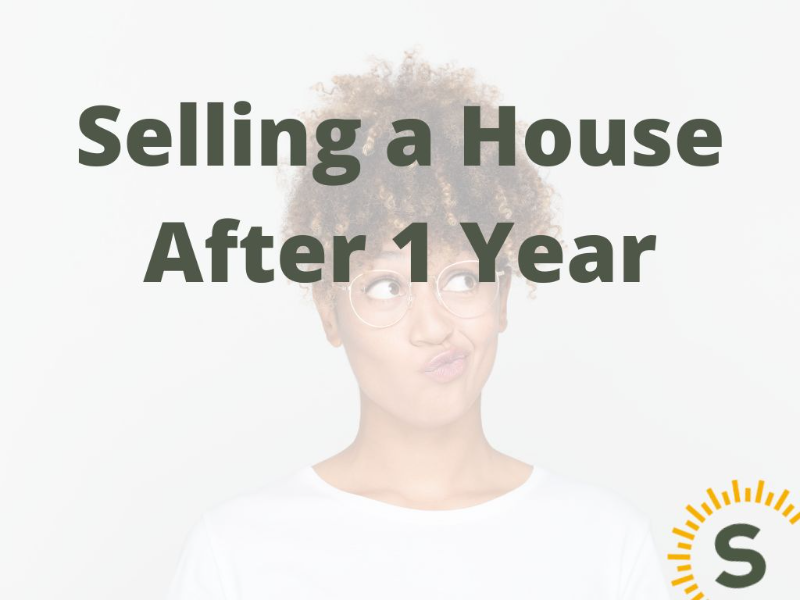
Life doesn't always go according to plan. Sometimes, unexpected situations pop up, and you find yourself selling a house after 1 year. it's fine, it can be tough. Whatever circumstances have led you to this point, they have clearly given you enough doubt to seriously consider this step, and that's not how buying a home was supposed to turn out.
Through this insight, we'll explore the process of selling a house after 1 year, covering mortgage lender policies, costs, and helping you decide how best to proceed.
There is no law specifying a minimum duration of home ownership before you can sell a property. However, some mortgage lenders have a 6-month clause that stops you from selling the property. This is primarily due to precautions against money laundering and financial irregularities. While most lenders won't approve another mortgage on the same property for at least 6 months, selling a house after 1 year is generally not considered too soon.
**** 4.2

Most banks, building societies, and mortgage companies in the UK won't lend money to finance a property purchase if the current owner has owned it for less than 6 months. This restriction can limit interest and cause difficulty in finding a buyer during the first few months of ownership.
Some mortgage lenders may offer limited concessions or exceptions. For example, if the first sale was an exchange transaction with a property developer, or if the more recent sale is to liquidate the estate of a deceased homeowner, lenders might be more flexible.
It wasn't long ago that you paid out for these costs, it may have taken you some time to finance, but unfortunately, you will have to repay. The costs of moving a year of purchasing include:
You may have already spent a considerable amount on moving furniture and other belongings. Selling a house after 1 year means you'll incur these costs again. Not only does this include removals, but it's likely when you move you start to throw away frozen food and bits that just don't make sense to move to the new home.
Estate agents and solicitors' fees are expensive. Selling a home 1 year after buying means you'll have to account for buying costs, selling costs, and buying costs again. If you've paid 2% of a sale price originally to sell your previous property, going through that again is making this decision a chunky financial decision. If you're selling for £200,000 each time, that's the potential of £8,000 on estate agent fees. You may want to consider using online estate agents to save money.
If you sell your house after only a year, you will not have built up much equity. This could result in a reduced profit when selling the property, especially in turbulent market times.
Selling a house after just 6 months may pose challenges due to the 6-month rule imposed by mortgage lenders. However, if you're selling to a cash buyer, you can sell the property as soon as you like, as they won't need mortgage approval.
When selling a house, the mortgage is typically repaid through the sale of the property. The sale price must cover the remaining balance on the mortgage. Since you've only been in the house for one year, you will not have built up much equity, but the property's value shouldn't have fluctuated too much. The buyer's funds are transferred to your solicitor, who will then pay off the mortgage in full, allowing you to take out a new mortgage on your next property.
Be aware that you may have to pay early repayment charges if you do not port your mortgage to a new home. That means, if you are selling but not buying your next home, you could face paying 3-5% of your loan amount.
Moving can be one of life's most stressful experiences. Doing it twice in a year can be especially challenging, particularly if you have children.
Potential buyers may have concerns about why you are selling so quickly, such as problems with the property, neighbours, or the area in general.
If your new home is not what you expected, it can be better to sell quickly and move on, rather than waiting around. This can be especially true if you feel like you pulled the trigger too soon but now you have found your ideal home.
Chances are the value of your house will not decrease within 12 months, so you shouldn't find yourself in negative equity.
Although selling a house shortly after purchasing it is unconventional, it can be lucrative in the right circumstances. If you find yourself in a favourable market, you might be tempted to take advantage and make a profit while the opportunity is there.
If you're stuck on the fence about what to do, here are some alternative ideas to selling after a year:
Instead of selling right away, you could explore making home improvements to create a space that feels more like home. Renovations or upgrades might help enhance your comfort and satisfaction with the property.
Another option is to consider letting the property out and moving to your ideal home anyway. Renting can provide you with some income while allowing you the flexibility to search for a new home that better meets your needs.
It can be beneficial to consult with a mortgage adviser to gather their professional opinion. They can provide insights on the financial implications and potential options available to you based on your specific circumstances. For example, it might be a consideration to wait until your fixed rate mortgage comes to an end to avoid fees.
This will depend on the market and your reason for selling. However, it's unlikely a property's value will fluctuate too much, upwards or downwards, after only a few months. If you require a quick sale for personal reasons, you may have to lower your asking price to attract buyers.
If you need to sell a property you've recently bought, a quick sale company or selling at an auction may be suitable options. These avenues typically involve cash buyers, ensuring a faster transaction without the need for mortgage approval. Read more on the timing of cash sales here: how long does it take to sell a house to a cash buyer? Be prepared for potential buyers to be suspicious if you're selling after only a matter of weeks, and be ready to explain your reasons for selling.
Selling a house after 1 year may not be the ideal scenario, but life has a way of throwing us curveballs. It's crucial to acknowledge that while making this decision, you need to be mindful of mortgage lender policies and the potential additional costs involved in a quick sale.

Stuart is an expert in Property, Money, Banking & Finance, having worked in retail and investment banking for 10+ years before founding Sunny Avenue. Stuart has spent his career studying finance. He holds qualifications in financial studies, mortgage advice & practice, banking operations, dealing & financial markets, derivatives, securities & investments.
 No minimum
No minimum  Newcastle-under-Lyme, Staffordshire
Newcastle-under-Lyme, Staffordshire Free Consultations
Free Consultations
 No minimum
No minimum  Free Consultations
Free Consultations
 No minimum
No minimum  No obligation consultation
No obligation consultation
 No minimum
No minimum  No obligation consultation
No obligation consultation
 No minimum
No minimum  Free Consultations
Free Consultations
 No minimum
No minimum  No obligation consultation
No obligation consultation
 No minimum
No minimum  No obligation consultation
No obligation consultation
 No minimum
No minimum  Free Consultations
Free Consultations
 No minimum
No minimum  Coatbridge, Lanarkshire
Coatbridge, Lanarkshire Initial or Ongoing Consultation Fees
Initial or Ongoing Consultation Fees
 No minimum
No minimum  Initial or Ongoing Consultation Fees
Initial or Ongoing Consultation Fees
 £21,000 +
£21,000 +  Initial fee free consultation
Initial fee free consultation
 London, Greater London
London, Greater London No obligation consultation
No obligation consultation
 No minimum
No minimum  No obligation consultation
No obligation consultation
 No minimum
No minimum  Initial fee free consultation
Initial fee free consultation
 No minimum
No minimum  No obligation consultation
No obligation consultation
 No minimum
No minimum  No obligation consultation
No obligation consultation
 No minimum
No minimum  Initial fee free consultation
Initial fee free consultation
 No minimum
No minimum  No obligation consultation
No obligation consultation
 £101,000+
£101,000+  Bishop's Stortford, Hertfordshire
Bishop's Stortford, Hertfordshire No obligation consultation
No obligation consultation
 No minimum
No minimum  Stockton-on-Tees, County Durham
Stockton-on-Tees, County Durham Free Consultations
Free Consultations
 No minimum
No minimum  Initial fee free consultation
Initial fee free consultation
 No minimum
No minimum  Cheltenham, Gloucestershire
Cheltenham, Gloucestershire No obligation consultation
No obligation consultation
 No minimum
No minimum  Free Consultations
Free Consultations
 No minimum
No minimum  Initial fee free consultation
Initial fee free consultation
 No minimum
No minimum  Free Consultations
Free Consultations





Our website offers information about financial products such as investing, savings, equity release, mortgages, and insurance. None of the information on Sunny Avenue constitutes personal advice. Sunny Avenue does not offer any of these services directly and we only act as a directory service to connect you to the experts. If you require further information to proceed you will need to request advice, for example from the financial advisers listed. If you decide to invest, read the important investment notes provided first, decide how to proceed on your own basis, and remember that investments can go up and down in value, so you could get back less than you put in.
Think carefully before securing debts against your home. A mortgage is a loan secured on your home, which you could lose if you do not keep up your mortgage payments. Check that any mortgage will meet your needs if you want to move or sell your home or you want your family to inherit it. If you are in any doubt, seek independent advice.